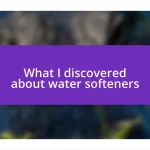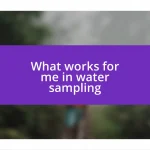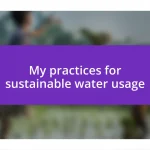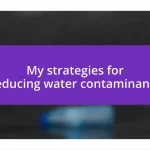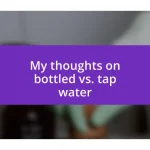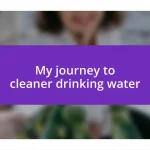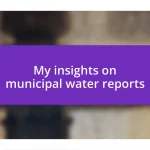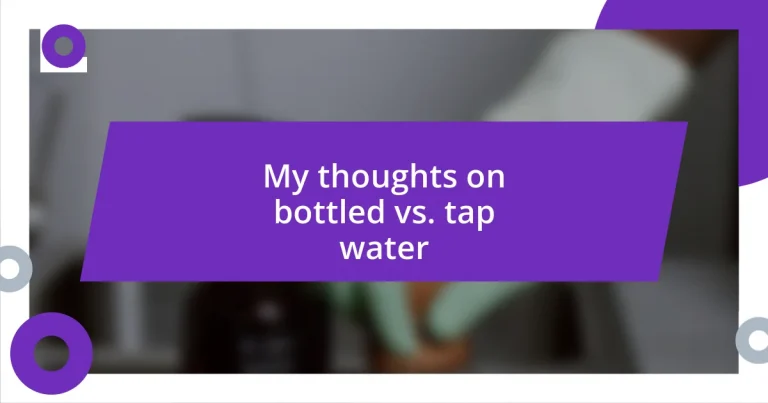Key takeaways:
- Tap water is a healthier, more cost-effective, and environmentally friendly option compared to bottled water, offering essential minerals and reducing plastic waste.
- Bottled water contributes significantly to plastic pollution, carbon emissions, and excessive resource usage, creating a larger environmental issue.
- Making informed choices about water sources encourages mindful hydration habits and fosters awareness of local water quality standards and their environmental impact.
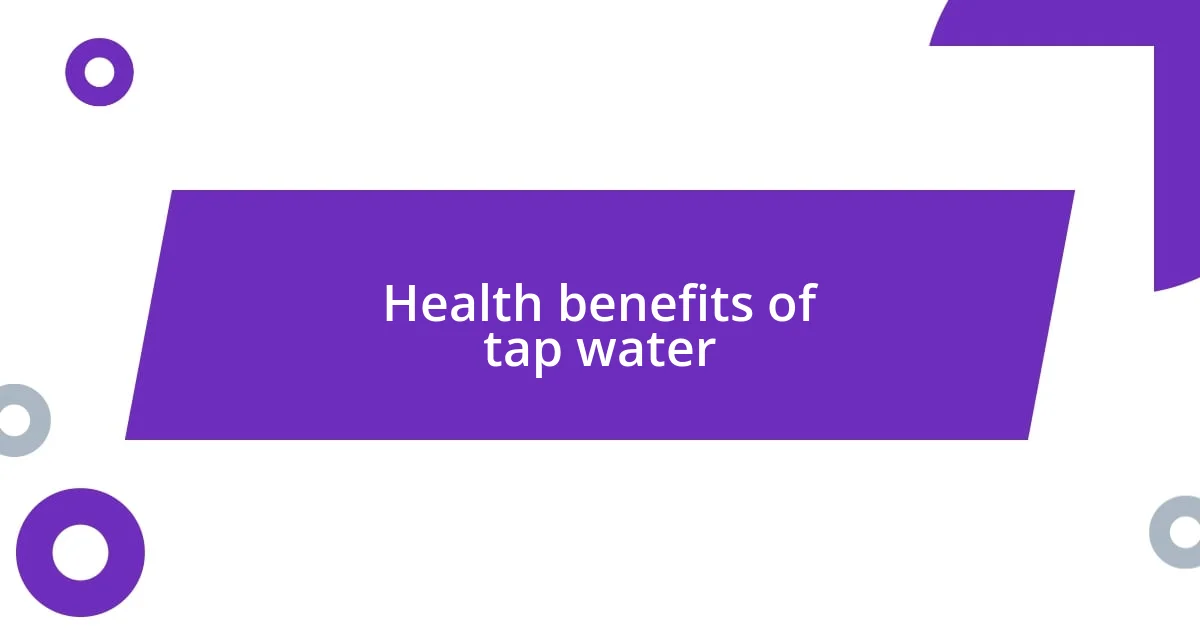
Health benefits of tap water
When it comes to hydration, tap water often emerges as a healthier choice. I remember the first time I switched to tap water; at first, I was unsure about the taste. However, after a short while, I learned that my local water supply is rigorously tested and treated to ensure it meets safety standards. Isn’t it refreshing to know that you’re sipping on water that’s not only accessible but also regulated for your health?
Studies consistently show that tap water can be just as safe, if not safer, than bottled water, often containing essential minerals like calcium and magnesium. I’ve found that when I drink tap water, not only do I stay hydrated, but I also contribute to my overall health by giving my body these key nutrients. Have you ever thought about how those minerals could be missing from your daily hydration routine?
Another remarkable aspect of tap water is its environmental impact. By choosing to drink tap water, I feel a sense of pride in reducing plastic waste and minimizing my carbon footprint. Isn’t it empowering to know that something as simple as turning on the faucet can make a positive contribution to both your health and the planet’s well-being?
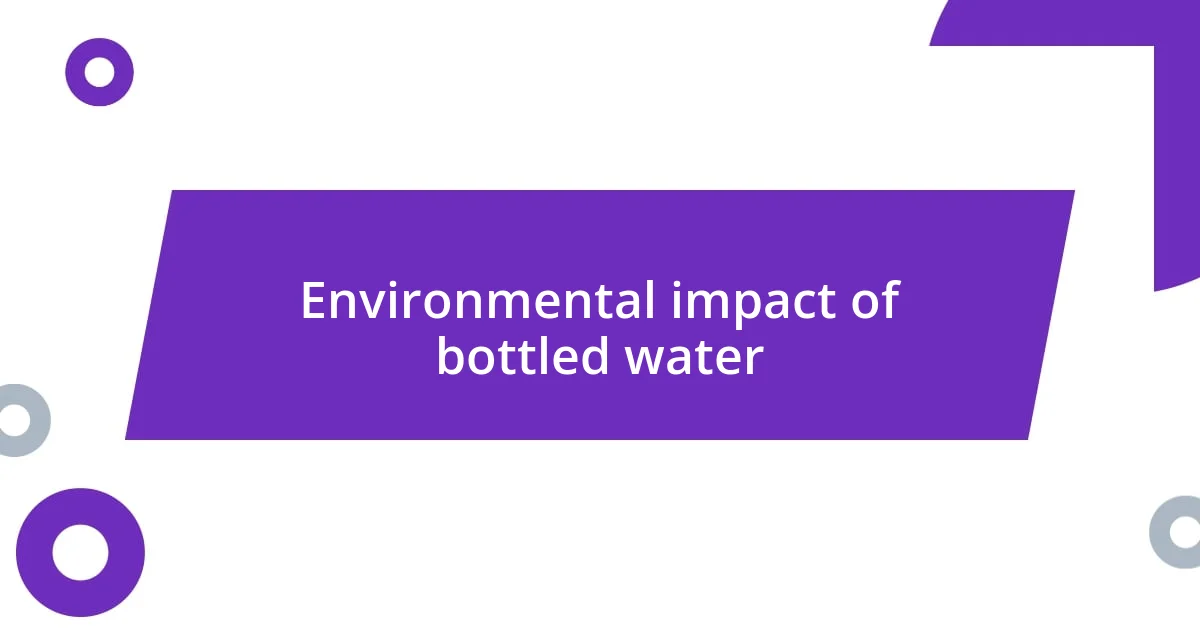
Environmental impact of bottled water
The environmental impact of bottled water is quite concerning when you dig deeper into the facts. I remember walking along the beach one day and noticing the numerous plastic bottles scattered along the shore. It struck me then how every bottled water choice contributes to a much larger issue: plastic waste. This plastic doesn’t just vanish; it lingers in our environment, taking hundreds of years to decompose and causing harm to wildlife.
Here are some specific issues caused by bottled water:
- Plastic Pollution: Over 1 million plastic bottles are bought every minute worldwide, leading to significant ocean and land pollution.
- Carbon Footprint: The production and transportation of bottled water results in substantial greenhouse gas emissions.
- Resource Usage: Manufacturing bottled water consumes enormous amounts of water—approximately three liters of water is required to produce one liter of bottled water.
Choosing tap water can make a noticeable difference, and every little action counts when it comes to protecting our planet.
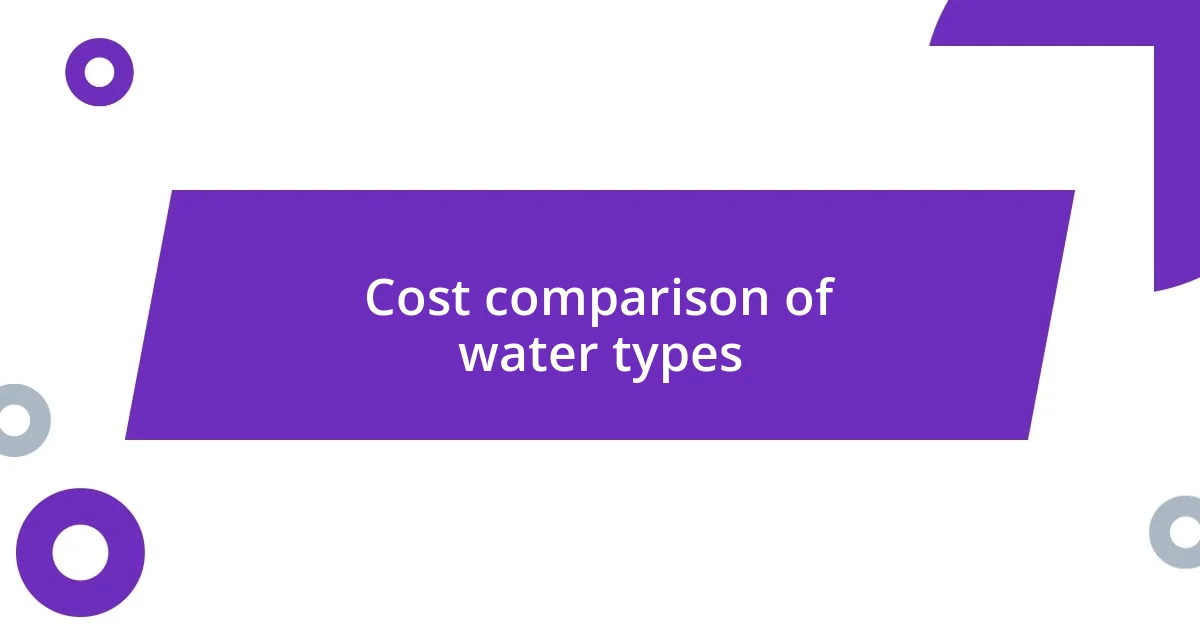
Cost comparison of water types
When it comes to cost, bottled water can be unexpectedly pricey. I recall my surprise when I added up my monthly expenses on bottled water. It turned out that I was spending nearly ten times more on bottled water compared to tap water. This realization made me reassess not just my budget, but also my water consumption habits.
In contrast, tap water is incredibly economical. For a couple of bucks, I can have an entire month’s supply of hydration right from my faucet. It’s remarkable to think that I can fill up reusable containers—or even my favorite water bottle—with clean, refreshing water without breaking the bank. This not only saves me money but also encourages me to drink more water since I don’t feel guilty refilling.
To illustrate this cost disparity, here’s a quick comparison:
| Type of Water | Estimated Monthly Cost |
|---|---|
| Tap Water | $1-5 |
| Bottled Water | $15-100 |
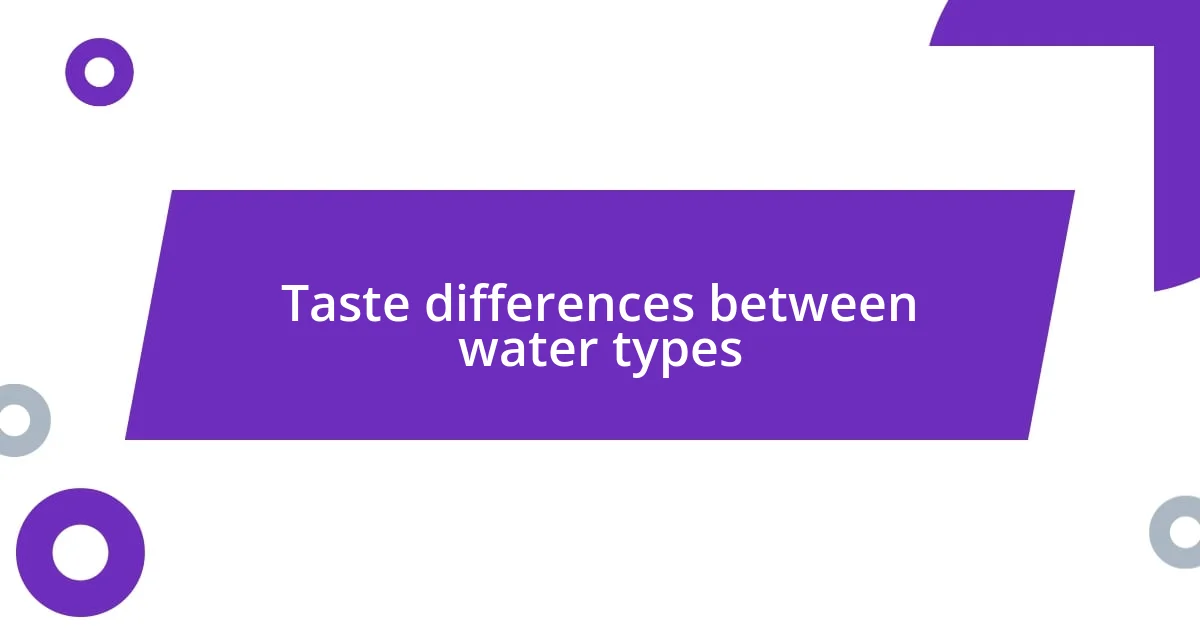
Taste differences between water types
Taste is one of the most noticeable differences between bottled and tap water. I distinctly remember a moment when I sipped on bottled water at a picnic—its crispness was refreshing, but it also had a faint plastic aftertaste that lingered longer than I expected. In contrast, when I drink tap water, it often has a subtle earthiness, which I personally find satisfying because it feels more natural and less processed.
In my experience, regional variations play a significant role in how tap water tastes. For instance, the tap water in my hometown’s old pipes has a certain metallic flavor that I’ve grown used to over the years. But I’ve also traveled to places like France, where the tap water is so soft and balanced that it tastes cleaner than the bottled varieties I typically buy. Isn’t it fascinating how location can influence our perception of something as simple as water?
While some people swear by the purity of bottled water, I sometimes wonder if we’re missing out on the authentic taste of our local drinking supply. That said, it’s important to note that not all bottled water is created equally. Some brands infuse their products with minerals to create a specific flavor profile that some might prefer over the blandness of tap water. Ultimately, it really comes down to personal preference and the qualities we value in our hydration.
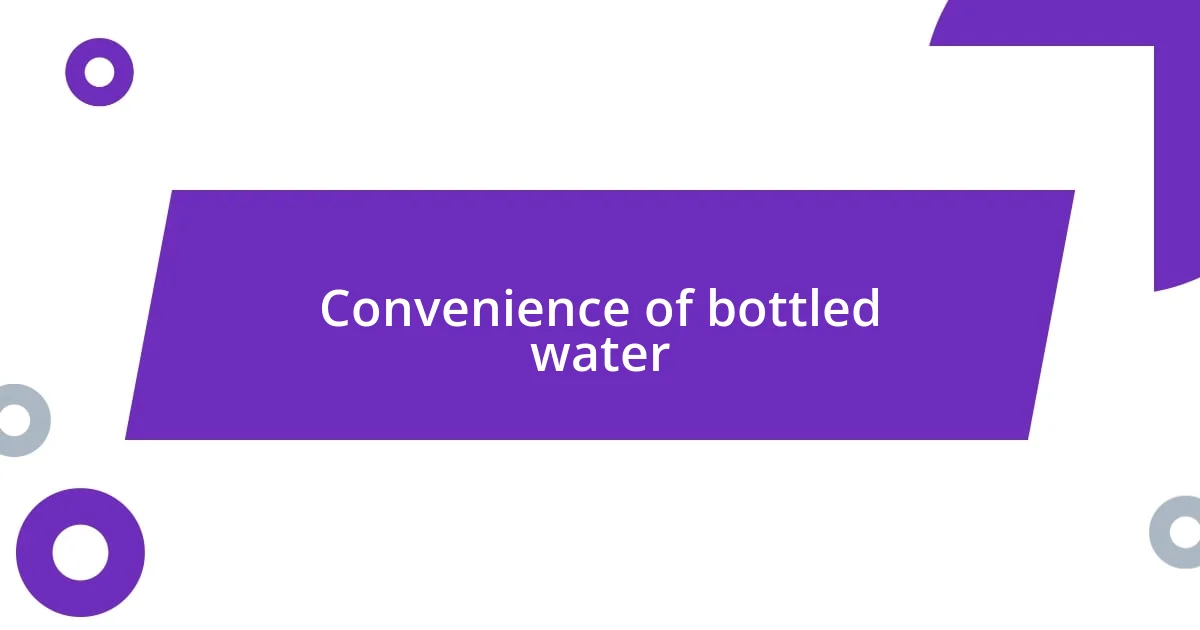
Convenience of bottled water
Bottled water definitely shines when it comes to convenience. I can’t tell you how many times I’ve been on the go—whether it’s rushing to a meeting or heading out for a hike—and the sheer ease of grabbing a bottle is a lifesaver. Imagine standing at a gas station counter, parched after a long drive, and finding that crystal-clear bottle of water waiting for you. It’s almost like a comforting friend you can count on in a pinch.
Another aspect I love about bottled water is its portability. I often keep a couple of bottles in my bag, just in case I find myself in a situation where I can’t easily access clean drinking water. There’s something reassuring about knowing that I have a reliable source of hydration wherever I am. Plus, if I’m at an event where water isn’t readily available, having that bottle in hand means I can easily stay hydrated without a second thought.
Now, it’s worth considering how bottled water can be a double-edged sword. While it’s incredibly easy to grab a few bottles and head out, I sometimes reflect on how this convenience leads to excessive waste. Have you ever noticed how many empty plastic bottles pile up after a weekend outing? Each time I recycle one, I’m reminded of the environmental impact. While bottled water serves its purpose, I can’t help but wonder if there are smarter, more eco-friendly ways to stay hydrated without compromising convenience.
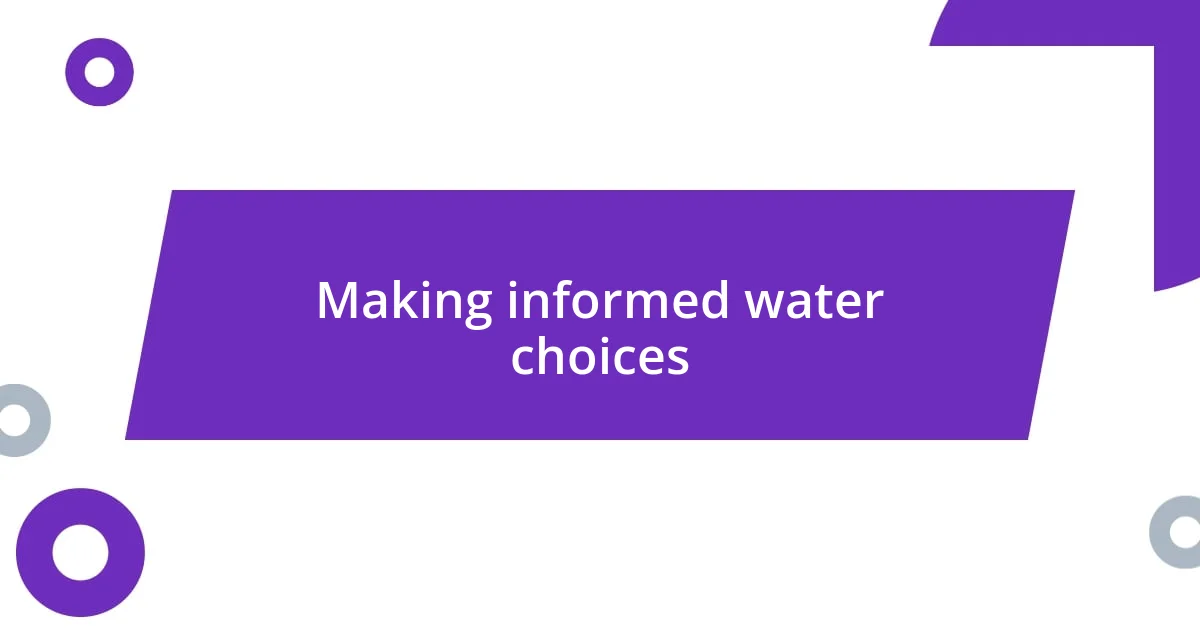
Making informed water choices
Making informed choices about water can actually feel quite empowering. I remember a time when I read the label on a bottled water brand, and I realized it contained “spring water” sourced from just a few miles away. It made me think, why not just fill my reusable bottle with the same local tap water? This moment sparked a deeper curiosity in me about what goes into the water I consume and where it comes from.
Have you ever checked your municipal water quality report? I did once, and honestly, it opened my eyes to the rigorous standards our local water is held to. It’s fascinating how tap water in many places is tested for contaminants and regulated far more than some bottled options. Knowing that my tap water passes through such scrutiny makes me feel more confident about filling my glass. After all, understanding these details allows me to make choices that align with my health goals.
The environmental aspect also weighs heavily on my mind. The last time I bought bottled water, I felt a pang of guilt thinking about the plastic waste I was contributing to. It’s a stark reminder that each time we choose between bottled and tap water, we aren’t just deciding what to drink; we’re also impacting the planet. This realization encourages me to be more mindful about how I hydrate, prompting me to lean toward eco-friendlier options whenever possible. After all, what we drink can ripple outwards in ways we might not even consider.

